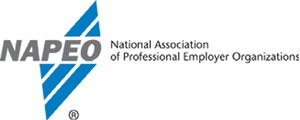Wisconsin Strengthens PEO Legislation, New Provisions Help Small Business with Human Resources Challenges
News provided by
National Association of Professional Employer Organizations (NAPEO)Mar 12, 2010, 11:10 ET
ALEXANDRIA, Va., March 12 /PRNewswire-USNewswire/ -- Wisconsin's small business owners and other small employers who have come to depend on the outsourced employment solutions of professional employer organizations (PEOs) for payroll, benefits, risk management and human resources are guaranteed tax credits and other economic incentives remain with them under passage of Senate Bill 504 this session.
The bill was unanimously passed by both the Senate and Assembly and updates the provisions of Wisconsin Act 189, which established the original regulatory framework for PEOs. The PEO market has grown substantially since passage of the statute in Wisconsin in 2007. The average PEO serves approximately 200 business clients and 4,000 workers.
"PEOs assume a wide variety of significant employer responsibilities for these small employers, including the delivery of risk management services," said Michael Gotzler of Madison headquartered QTI Human Resources Inc. "They also pay the wages of worksite employees, manage payroll tax payments and compliance, improve compliance with federal and state labor regulations, share human resource management best practices and sponsor many employee benefit programs including health care and retirement savings plans. Ironically it is this shared or co-employment arrangement that lead to the need to clarify that tax credits and economic benefits offered by local government belong to the client and not the PEO."
Melinda Heinritz, executive director of the Wisconsin Historical Foundation and long-time PEO client of QTI Human Resources, explained, "We rely heavily on the services and expertise of QTI to help us effectively navigate all aspects of human resources management. Doing so allows the Foundation to focus time and energy on fulfilling our mission and executing our core competencies in marketing, membership and fundraising on behalf of the Wisconsin Historical Society."
Gotzler worked with the PEO industry's trade association, the National Association of Professional Employer Organizations (NAPEO) and the Department of Regulation and Licensing to ensure the original intent of the act provided a layer of safeguards and oversight for small business owners and their employers in PEO outsourcing arrangement. Under the original law, PEOs were wrongly classified as temporary help agencies leading to some of the administrative confusion.
As in 34 other states, PEOs in Wisconsin are required to maintain minimum financial standards, file annual audited financial statements, and register with the Department of Regulation and Licensing.
NAPEO says the concept of regulating PEOs is not a new one. The provisions contained in this bill are based on model legislation. "Over the past 25 years, these standards and requirements have been tested and refined to strike the balance of the need for responsible regulation," said Milan Yager, president and CEO of NAPEO. NAPEO represents the $68 billion industry, which has experienced double digit growth for the past five years.
The bill was sponsored by Senator Bob Wirch and led through the Assembly by Representative Steve Hilgenberg, who introduced companion legislation Assembly Bill 716.
About NAPEO
As the recognized Voice of the PEO Industry,® NAPEO represents nearly 400 professional employer organizations (PEOs). The PEO industry has matured to $68 billion with double digit growth annually since 2004. As NAPEO enters its 25th year, the potential market remains promising with high client retention rates, a projected increase in revenues for 2010, and the current untapped market now serving 300,000 business owners and 2 to 3 million workers. PEOs allow clients to "reduce costs and free up time to devote to revenue generating activities, improvements that can be instrumental to gaining competitive advantage," according to research by the Society of Human Resource Management Foundation. To learn more about how PEOs contribute to small businesses' success, visit the NAPEO Web site at www.napeo.org.
SOURCE National Association of Professional Employer Organizations (NAPEO)
WANT YOUR COMPANY'S NEWS FEATURED ON PRNEWSWIRE.COM?
Newsrooms &
Influencers
Digital Media
Outlets
Journalists
Opted In





Share this article